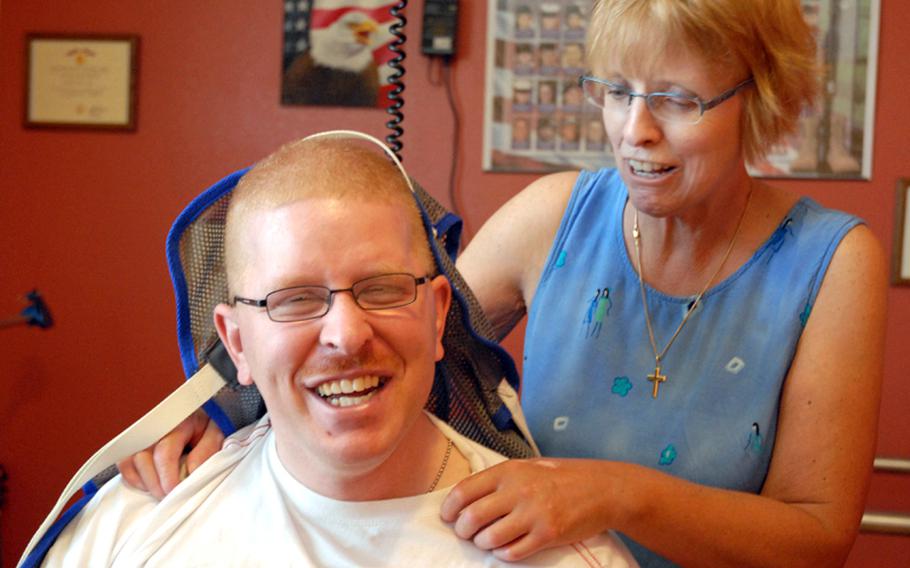U.S.
Military caregivers for injured vets, often family, number up to a million
Stars and Stripes March 6, 2013

Christine Schei with her son, Erik, during one of his therapy sessions. Army Spc. Erik Schei was shot in the head during a patrol in Iraq on Oct. 26, 2005. The doctors said he would never recover from the catastrophic brain injury, and urged the family to take him off life support. (Megan McCloskey/Stars and Stripes)
WASHINGTON -- As many as 1 million Americans serve as caregivers for wounded troops and veterans with few existing resources and no national strategy to help them, according to a new study by RAND to be released Thursday.
The report, commissioned by the Elizabeth Dole Foundation, found that spouses, parents and siblings of wounded troops face increased stress, greater risk of heart disease, compromised immune functions and a host of other health threats because of the physical and emotional demands of caring for their infirm loved ones.
“They suffer disproportionately from mental health problems and experience emotional distress associated with caregiving,” the document stated.
“Despite the need, no national strategy for supporting military caregivers exists. Government agencies and other organizations are trying to help, but most programs are in their infancy and inadequate to meet the needs of this growing population.”
Military officials and lawmakers in recent years have worked to refocused the public on sacrifices and stresses military families face. But RAND researchers note that families hardest hit by the wars in Iraq and Afghanistan -- those whose troops were severely injured -- are still a largely invisible segment of society.
The report is the first to attempt to quantify the number of military caregivers in America today: between 275,000 and 1 million, although authors admit it may be even higher.
About 63,000 troops were medically evacuated from combat zones with life-changing wounds between October 2001 and December 2011, but researchers note that number doesn’t include all traumatic brain injury victims, post-traumatic stress disorder cases, and a host of other injuries that might require around-the-clock care.
And those numbers don’t include tens of thousands of older veterans in need of care because of injuries from earlier wars or declining health from advanced age.
Researchers said military caregivers face the unique challenge of dealing not only with their family members’ injuries but also navigating the military and veterans affairs health systems, a daunting task even for those familiar with their workings.
Despite the challenges, caregivers have few resources exist to help with the work.
“There exists a bewildering maze of potential services and support that caregivers can or must navigate,” the report stated. “Though well-intentioned, community-based efforts to serve this population are scattered and largely uncoordinated.”
Officials from the Dole Foundation say they hope to change that. In addition to the study, the foundation is coordinating efforts between Google and a group of military advocacy groups to better connect caregivers to available medical, legal and emotional support resources.
RAND officials said they also plan to work with the foundation on future research on the caregiver population, and in developing a national approach to their needs.
shane.leo@stripes.com Twitter: @LeoShane